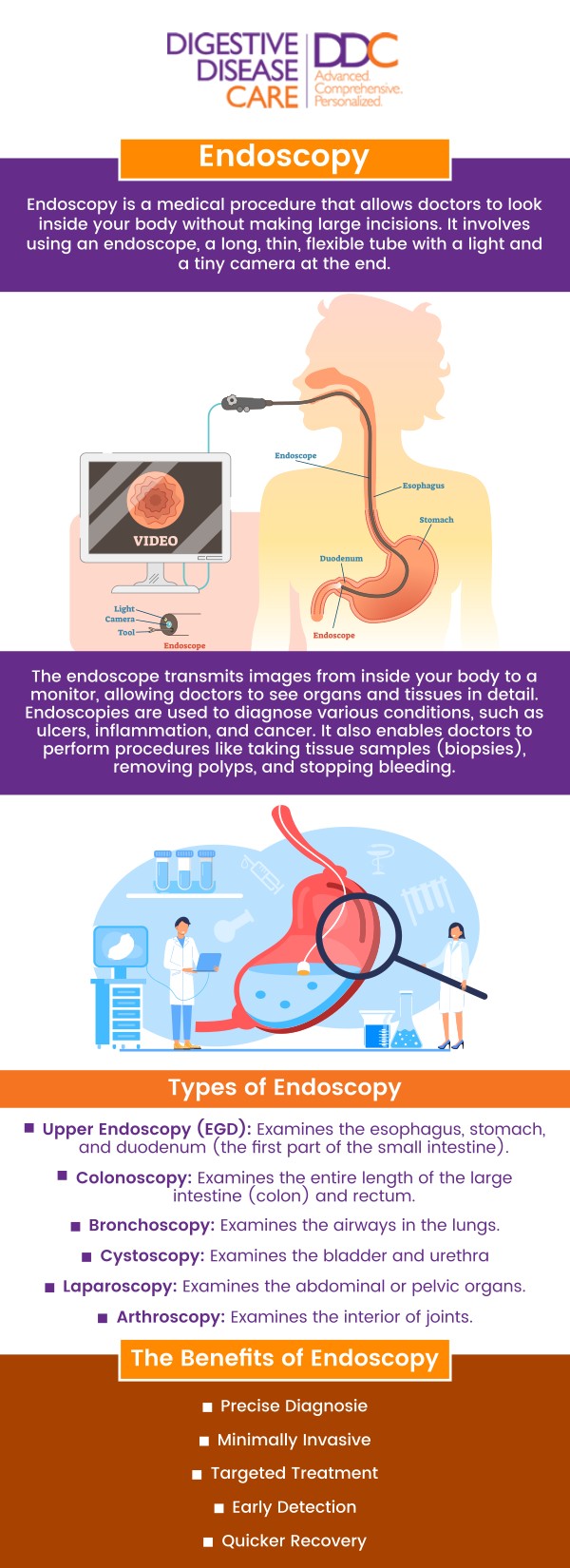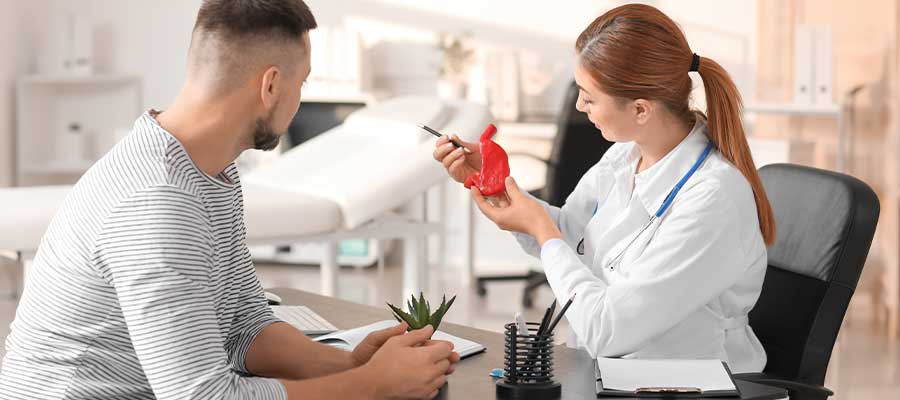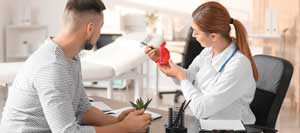What to Expect During and After Upper Endoscopy Q&A
An endoscopy is a non-invasive medical procedure in which a flexible tube with a camera on the end is inserted into various parts of the body to provide the doctor with a visual examination of the organs and tissues. Gastrointestinal endoscopies are the most common type of endoscopy performed and allow doctors to view the inside of the digestive tract to identify blockages and other anomalies. To learn what to expect during and after an upper endoscopy, consult with our team at Digestive Disease Care (DDC), where we provide personalized care and guidance throughout the process. For more information, contact us today or schedule an appointment online. We have convenient locations to serve you in Babylon NY, East Setauket NY, Forest Hills NY, Jericho NY, Lake Success NY, Melville NY, Mineola NY, Massapequa NY, New Hyde Park NY and Riverhead NY.




Table of Contents:
What is the recovery time for an endoscopy?
Can an endoscopy detect a blockage?
What organs can a doctor see during an endoscopy?
What not to do after an endoscopy?
Recovery time may vary depending on the person and the type of endoscopy, but most people can return to their normal activities the day after the procedure.
Some mild side effects that are common during recovery time include a sore throat, bloating, gas, and mild abdominal discomfort. These side effects typically improve within a few days and can be managed with over-the-counter painkillers.
Patients are advised to rest and avoid strenuous activities for at least 24 hours following their procedure and are also advised not to drive, operate heavy machinery, or consume alcohol for the same amount of time.
One potential reason for undergoing an endoscopy is to detect a blockage in the digestive system.
Blockages can occur for various reasons, including tumors, inflammation, scar tissue, or foreign objects.
During an endoscopy, your doctor can observe the inside of your digestive system and identify any areas where the passage may be obstructed. If a blockage is detected, your doctor will be able to determine the cause of the obstruction and develop a treatment plan.
In some cases, the doctor may be able to use the endoscope to remove the blockage or tissue samples for further testing.
However, in some cases, additional diagnostic tests or procedures may be necessary.
Endoscopies allow doctors to view internal organs and tissues quickly and effectively, without the need for more invasive methods of examination. The information gathered during an endoscopy is useful in diagnosing conditions and determining the most appropriate treatment options for patients.
Gastrointestinal endoscopies are the most common type of endoscopy performed and allow doctors to view the inside of the digestive tract.
During a gastroscopy, the doctor can see the esophagus, stomach, and the first part of the small intestine (duodenum). A colonoscopy allows doctors to view the large intestine or colon, and this type of endoscopy helps detect conditions such as inflammatory bowel disease, polyps, and cancer.
After an endoscopy, patients should follow some general guidelines on what not to do to best preserve their health and well-being.
To begin with, patients should not drive or operate heavy machinery right after the procedure. Anesthesia or sedatives will be used during the endoscopy, which can impact coordination, judgment, and/or depth perception, and can cause drowsiness or dizziness.
Patients must also not eat or drink anything for the first few hours after their procedure. A small amount of water can be consumed after 30 minutes, and the patient’s normal diet can be resumed after a few hours, as advised by their physician.
Additionally, patients should avoid smoking or consuming alcohol after the endoscopy, as these can irritate or worsen the effects of the sedatives.
Strenuous activities or exercises should also be avoided until your physician clears you to undertake them, as heavy lifting or bending can cause discomfort or increase the risk of bleeding from the site where the procedure is done.
Our team of specialists would be happy to go over your options so that you can feel comfortable and confident moving into your next steps. Contact us today for more information or request an appointment online. We have convenient locations to serve you in Babylon NY, East Setauket NY, Forest Hills NY, Jericho NY, Lake Success NY, Melville NY, Mineola NY, Massapequa NY, New Hyde Park NY and Riverhead NY.

Additional Services You May Like

Additional Services You May Like
- Abdominal Pain
- Acid Reflux
- Barretts Esophagus
- Bloating
- Capsule Endoscopy
- Celiac Disease
- Colon Cancer Screening
- Colonoscopy
- Constipation
- Crohns Disease
- Diarrhea
- Diverticulitis
- Esophageal PH Monitoring
- Fatty Liver
- Fibroscan
- Gallstones
- Gastroenterologist
- Gastric Chest Pain
- Gluten Intolerance
- Hemorrhoid
- Hemorrhoid Banding
- Hepatitis
- Irritable Bowel Syndrome
- Lactose Intolerance
- Pancreatitis
- Polyps
- Rectal Bleeding
- Stomach
- Ulcerative Colitis
- GI Urgent Care





